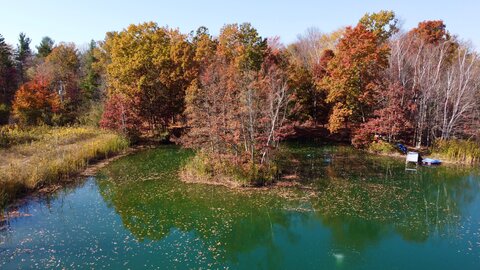Michigan has referred 24 people for prosecution over wetland laws over 3 years
State environmental agency referred 24 people to Attorney General Dana Nessel for prosecution
One of Michigan’s environmental agencies referred 24 people for prosecution to Attorney General Dana Nessel’s office over 2023, 2024, and 2025 so far, according to a document obtained through a public records request.
“There were 6 such referrals in 2023, 13 in 2024, and 5 so far in 2025 – for a total of 24,” wrote Holly Gokee, an executive secretary in the Department of Environment, Great Lakes, and Energy’s water resources division.
Michigan has about 6.5 million acres of wetlands.
Michigan Capitol Confidential filed a records request, seeking every wetland restoration agreement the department has approved in 16 counties since 2022.
The presence of a wetland limits how landowners may use their property due to various laws and regulations. The department sometimes acts when it gets tips or complaints about a wetland. It uses in-person visits and other means to gather information.
When the department believes that a landowner has violated a law or regulation, it first sends a violation notice. If the property owner doesn’t respond or disobeys the violation notice, an employee elevates the case to the enforcement unit, which pursues either a monetary settlement or restoration agreement.
If a landowner does not comply, the case “would move up the chain, and it would go to the attorney general’s office if there’s no cooperation from the landowner,” Emily Lensing, who works at the Water Resources Division, told CapCon in a phone interview.
Enforcement may take several forms. In one case, a property owner built a house on wetlands without first getting a permit and then sold the property to someone else.
“In this case, it’s a house. (The new property owner) can’t just tear the house down and fix it,” Lensing said. “There have to be other options for some of those wetlands to be replaced.
CapCon has covered a wetland dispute that could cost Freeland resident Zach Wenzlick $1.7 million for expanding his pond, a former sand mine.
 Michigan has ordered a Freeland man to partially fill a pond on his property | Zach Wenzlick
Michigan has ordered a Freeland man to partially fill a pond on his property | Zach Wenzlick
Wetlands absorb water to prevent flooding, according to the environmental department. Wildlife, including migratory waterfowl, and rare, threatened, or endangered wildlife species use wetlands to breed, nest, and eat. Wetlands protect subsurface water, recharge groundwater supplies, and control erosion.
Michigan either must change its wetland laws or change how the environmental agencies interpret the rules for private property, Rep. Matthew Bierlein, R-Vassar, told CapCon in a phone interview.
Bierlein said that wetlands have environmental benefits, but in the case of Wenzlick, no one was harmed by expanding the pond.
“There’s no risk to the environment,” Bierlein said. “There’s no destruction of habitat. All they did was create a better space.”
“For the state to be able to come in and say, ‘You broke the law, you’ve ruined this natural resource’ — it would be comical if it weren’t so egregious.”
In April, two Michigan men asked a federal judge to strike down as unconstitutional a state law that restricts the way property owners may manage wetlands, CapCon reported.
Michigan Capitol Confidential is the news source produced by the Mackinac Center for Public Policy. Michigan Capitol Confidential reports with a free-market news perspective.


 Torch Lake couple takes EGLE to federal appeals court over permit standoff
Torch Lake couple takes EGLE to federal appeals court over permit standoff
 Michigan regulators order family fishing spot filled
Michigan regulators order family fishing spot filled